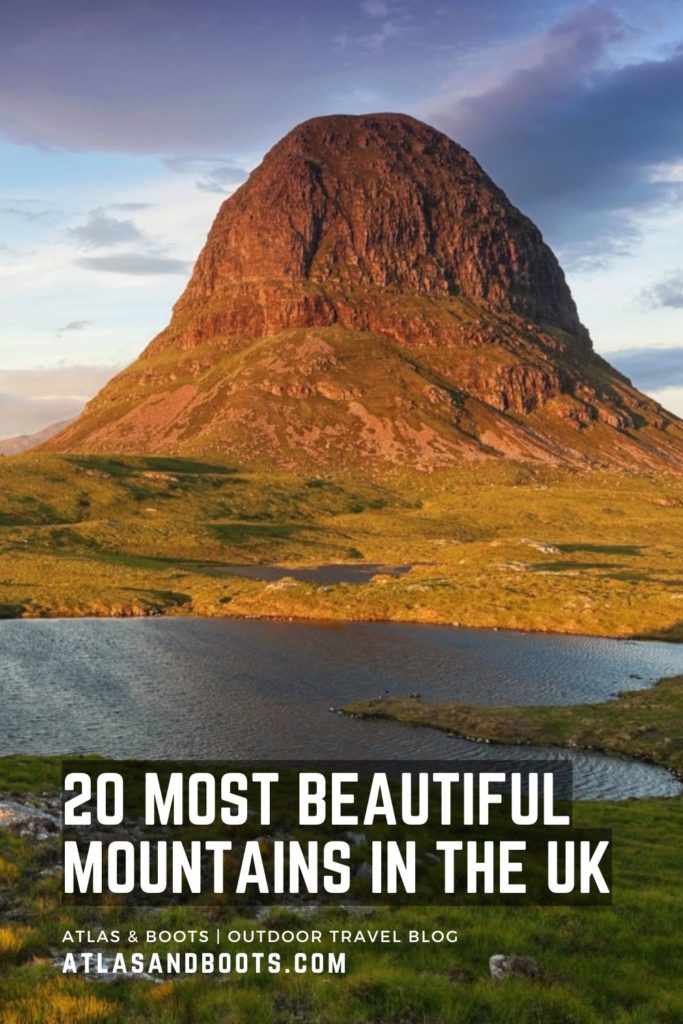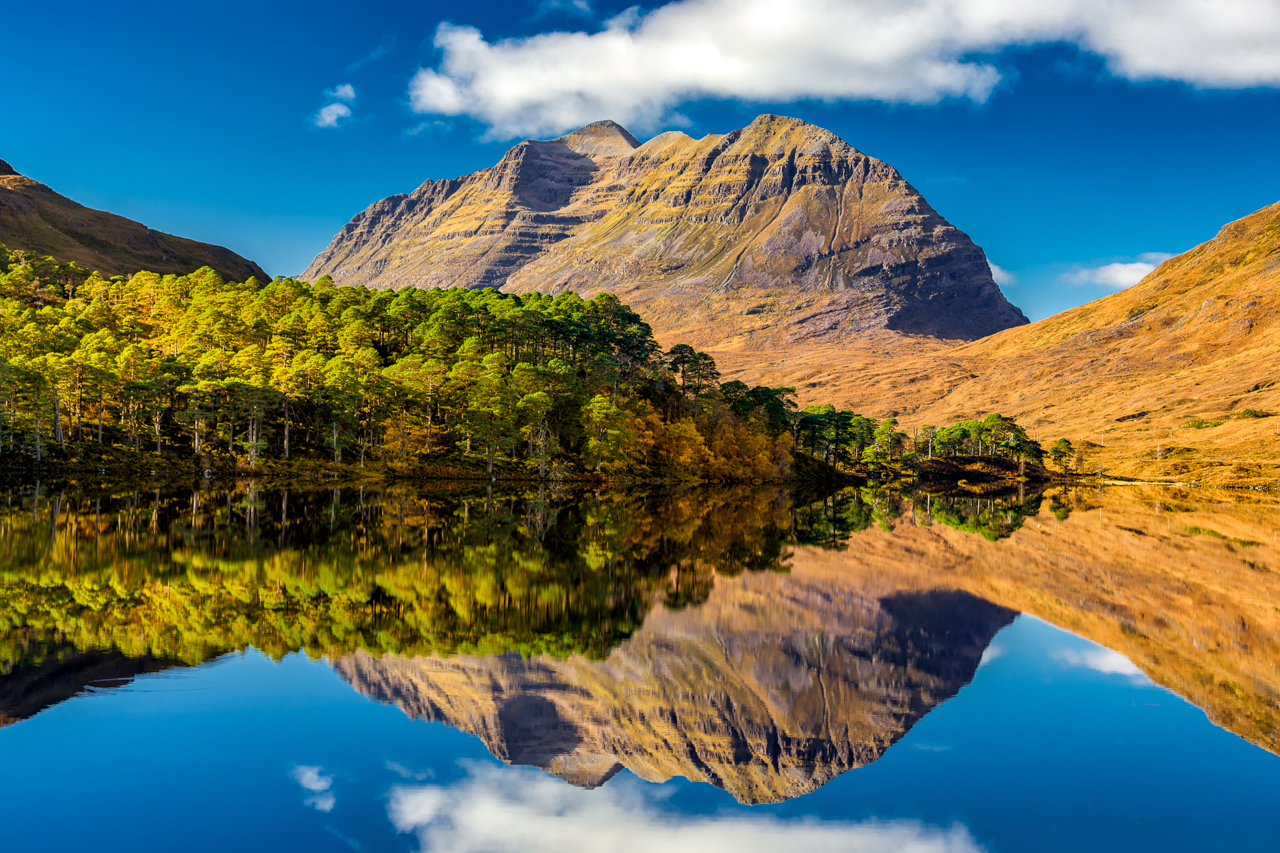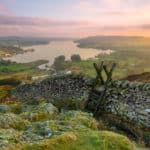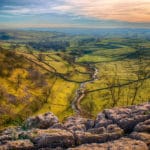While Britain may not be tall, it does have majesty. We scoured the home nations to find the most beautiful mountains in the UK
Alpine, Britain is not. In the UK, there are no sky-scraping summits; there are just 141 peaks over 1,000m (3,281ft), let alone the atmosphere-kissing eight-thousanders found in the great ranges of Asia. In fact, with an average mean elevation of just 162m (531ft), the UK is one of the world’s lowest-lying countries.
While we can’t contend with the Rockies, Andes or Himalaya, fortunately, around 20,000 years ago, during the last ice age, glaciers covered most of Britain’s landscape. Thanks to those colossal creaking chunks of ice, we can see and enjoy some arresting topography around the British Isles, which deserves to be celebrated.
A print version of our 2026 Most Beautiful Mountains in the UK Calendar is available to buy via Lulu.com.
Most beautiful mountains in the UK
Our list of the most beautiful mountains in the UK is unashamedly subjective. We haven’t used complex metrics or assessed their prominence, summit views or difficulty to scale. Instead, we asked Reddit and chose aesthetically striking peaks, be it the pyramidal shape of Scotland’s Buachaille Etive Mòr or the jagged spine of England’s Chrome Hill.
These mountains are all remarkable in a specific way and, we believe, deserve a place on this list. So, without further ado, and in no particular order, here is our list of the most beautiful mountains in the UK.
1. Suilven
Height: 731m (2,398ft)
Location: Scotland
Suilven’s aesthetic power lies not just in its shape, but in its sheer improbability – a lone sentinel sculpted by time, standing proudly in a sea of wilderness.
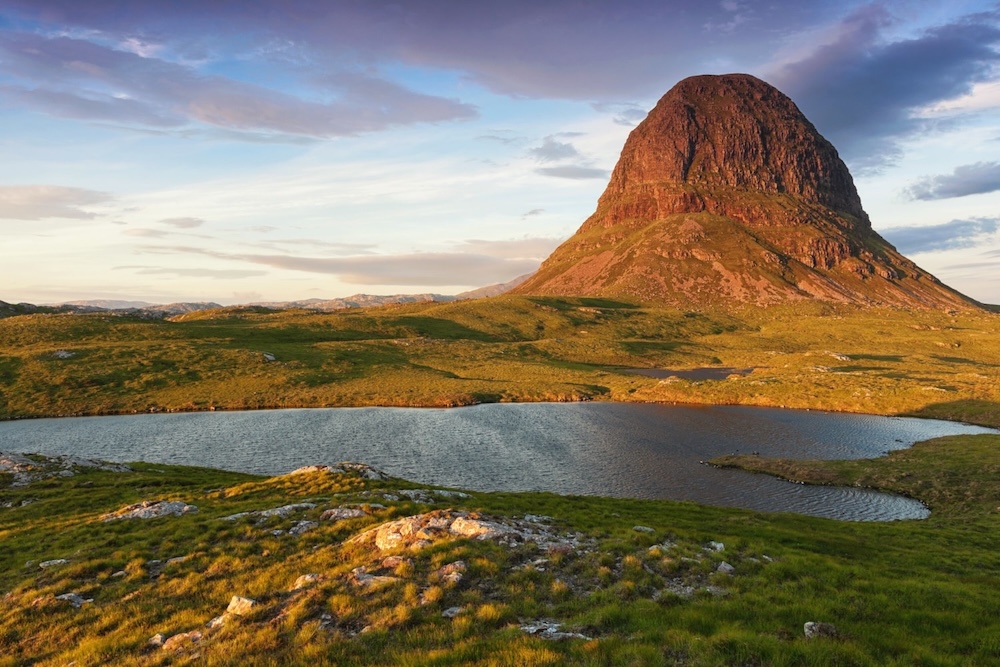
Rising like a sleeping giant from the ancient landscape of Assynt in northwest Scotland, Suilven is a mountain that defies expectation with its surreal, otherworldly form. Though not particularly high by Scottish standards, its steep-sided, whale-backed ridge towers above the lochs and moorlands in stark isolation, creating a profile that’s both graceful and terrifying.
2. Buachaille Etive Mòr
Height: 1,021m (3,350ft)
Location: Scotland
Buachaille Etive Mòr, often simply called ‘The Buachaille,’ is one of Scotland’s most iconic mountains, standing like a majestic stone sentry at the gateway to Glen Etive. Its pyramidal shape, especially when viewed from the A82 road near Glencoe, gives it an almost mythic presence – steep, symmetrical and instantly recognisable.
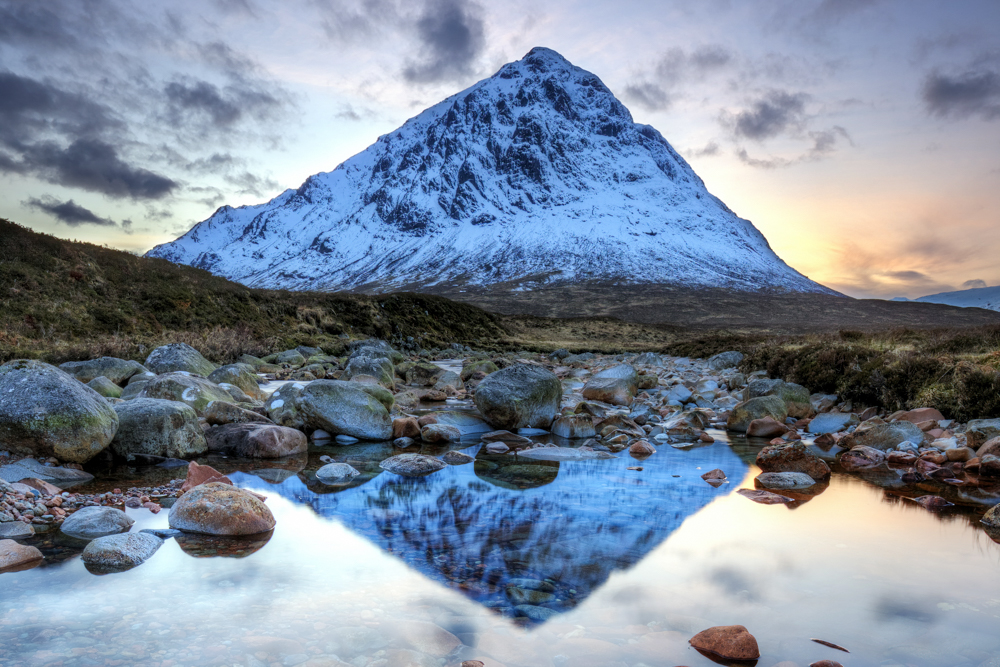
Soaring sharply from the surrounding moorland, its ridges and cliffs seem to cut into the sky. With cascading waterfalls at its base and a commanding view over some of the Highlands’ most dramatic scenery, Buachaille Etive Mòr is a symbol of the wild beauty that defines Scotland’s landscape.
3. Helvellyn
Height: 950m (3,117ft)
Location: England
England’s third-highest mountain and one of the crown jewels of the Lake District is the infamous Helvellyn with its hair-raising Striding Edge ridge.
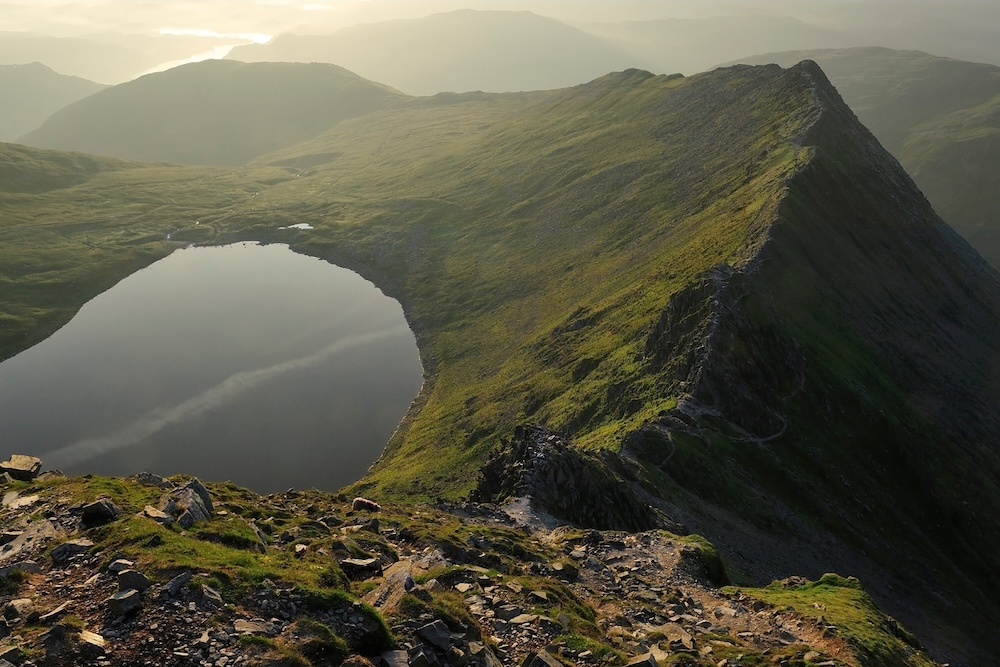
The peak captivates hikers with its sweeping curves, towering ridges, and dramatic eastern face that plunges into the glacial coves of Red Tarn. Its most iconic feature, the razor-thin Striding Edge, offers an exhilarating route across a rocky spine, drawing hikers and photographers eager to experience its breathtaking exposure and panoramic views.
4. Roseberry Topping
Height: 320m (1,049ft)
Location: England
The distinctive summit of Roseberry Topping is known as the ‘Yorkshire Matterhorn’, although no ropes, ice axes or crampons are needed on this extremely modest hill in the North York Moors.
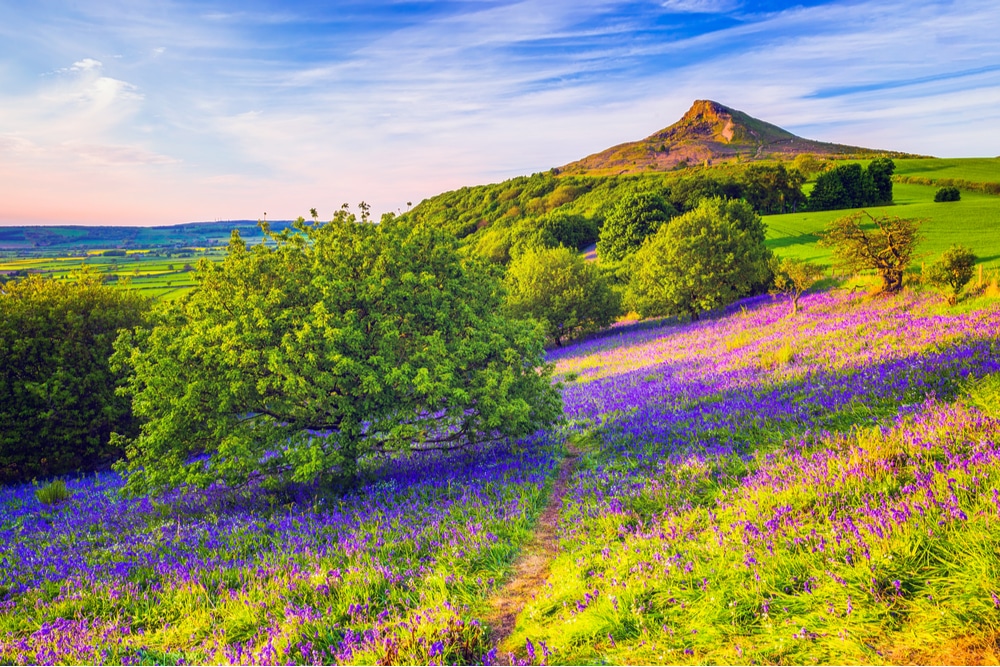
A unique set of circumstances causes the hill’s irregular shape. Until 1912, the summit resembled a sugarloaf, a result of millions of years of its sandstone cap protecting the underlying shales and clays from erosion. But then the combination of lying on a geological fault and a mining collapse carved the hill into today’s unique half-cone summit.
5. Tryfan
Height: 918m (3,010ft)
Location: Wales
Tryfan, rising dramatically from the Ogwen Valley in Snowdonia, is a mountain that seems almost chiselled by myth – its rugged profile and jagged summit ridges giving it the appearance of a giant stone beast frozen in time.
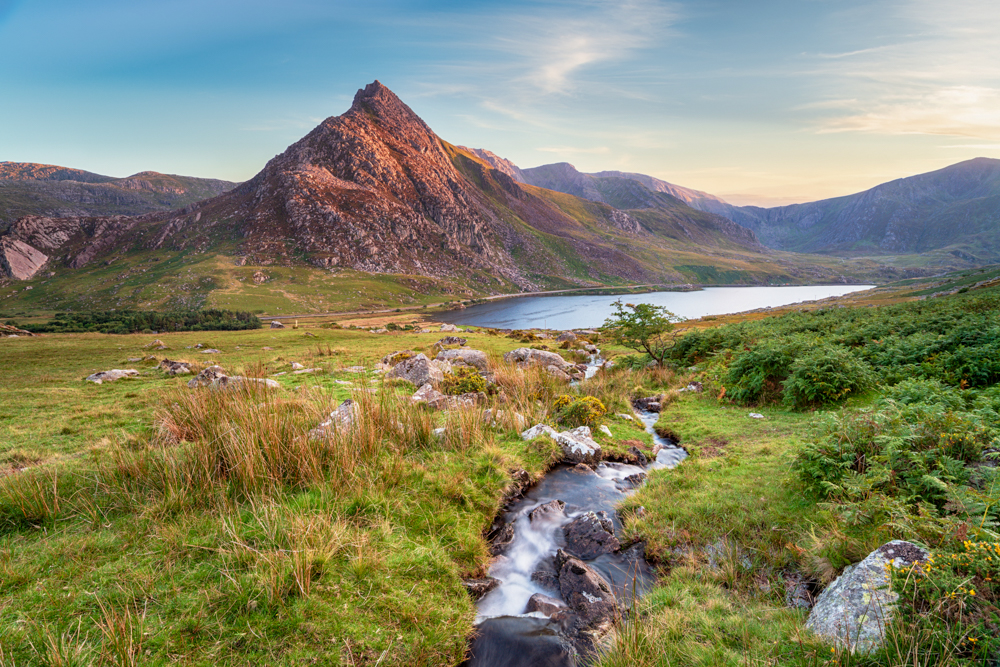
Unlike many peaks, Tryfan doesn’t just blend into the landscape; it dominates it, with steep, craggy flanks that rear abruptly above the valley floor. Its distinctive summit rocks, known as Adam and Eve, add a touch of legend and challenge, inviting brave climbers to leap between them for good luck. With its unmistakable silhouette and the raw, elemental feel of its granite slopes, Tryfan is both a climber’s playground and an aesthetic marvel, and one of Wales’ most beautiful and characterful mountains.
6. An Teallach
Height: 1,063m (3,486ft)
Location: Scotland
An Teallach, meaning ‘The Anvil’ in Gaelic, is one of Scotland’s most alluring mountains and a magnet for photographers, climbers and hikers alike, drawn to its jagged ridgeline of sandstone pinnacles and cliffs offering sheer drops and breathtaking views.
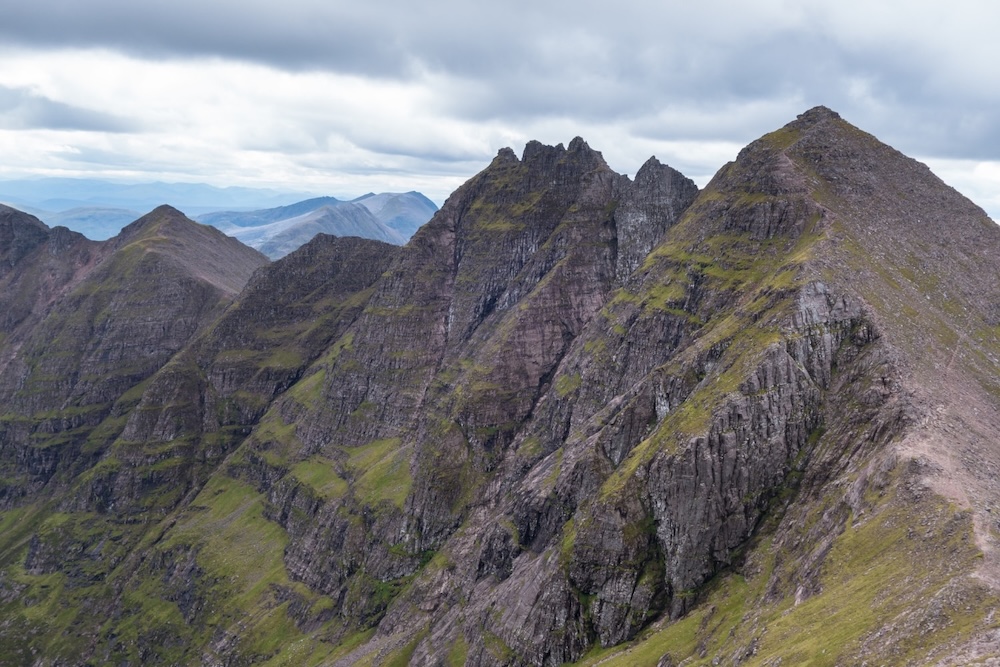
Essentially a massif, An Teallach has 10 distinct summits over 914.4m (3,000ft), but only the peaks of Bidean a’ Ghlas Thuill at 1,063m (3,486ft) and Sgùrr Fiona at 1058m (3473ft) qualify as independent Munros. Despite its mass, it is the mountain’s sculptural form and ever-changing light – golden at sunset, ghostly beneath cloud – that makes it truly captivating.
7. The Cobbler (Ben Arthur)
Height: 884m (2,900ft)
Location: Scotland
Perched above the shores of Loch Long in the Arrochar Alps, The Cobbler is a mountain whose eye-catching, craggy summit has long grabbed the imagination of visitors.
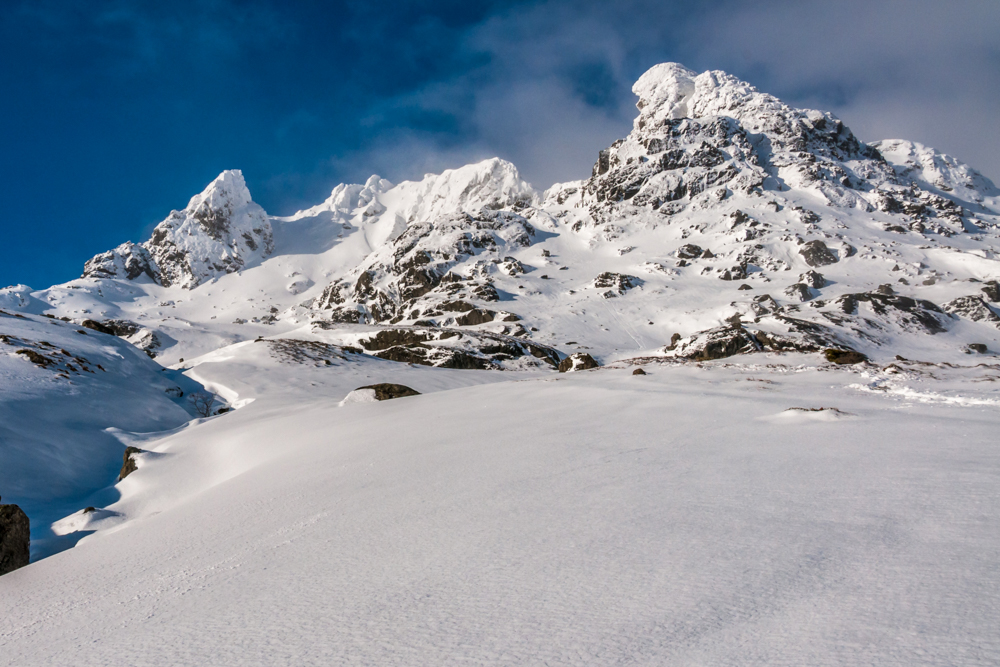
Its iconic, jagged rock formations resemble a seated figure supposed to represent a cobbler bent over – hence the nickname – and give the peak a dramatic, sculptural quality. Though relatively modest in stature (it doesn’t qualify as a Munro), the Cobbler punches above its weight in visual impact, with sheer cliffs, weathered spires and a summit that seems tailor-made for dramatic silhouettes.
8. Liathach
Height: 1,055m (3,461ft)
Location: Scotland
Regularly rated by many mountaineers and walkers as one of Scotland’s finest mountains to climb, scramble or hike, Liathach is also regarded as one of Scotland’s most visually captivating peaks.
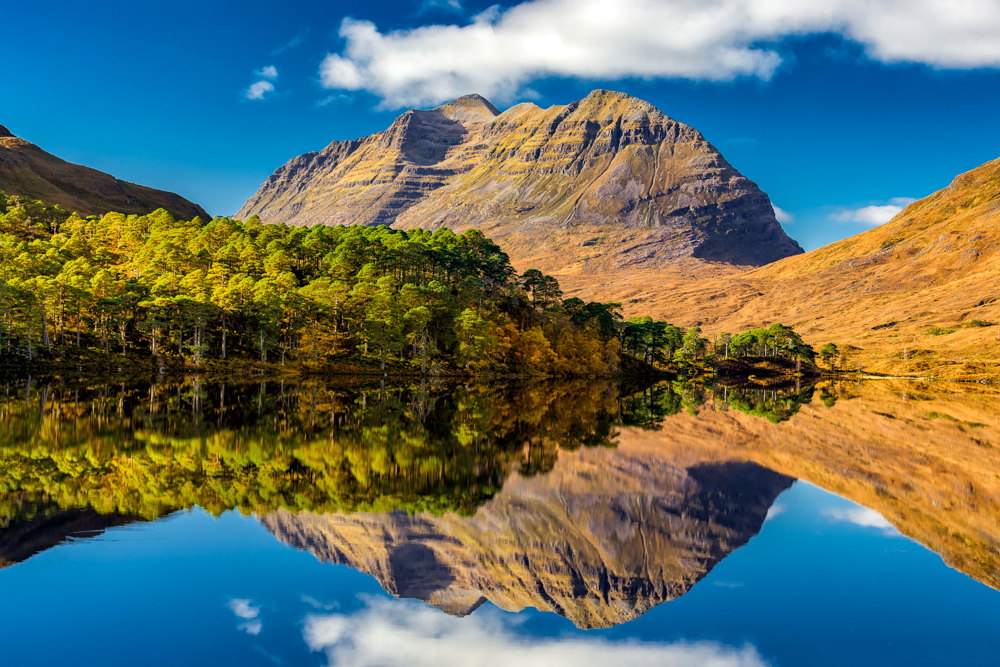
The mountain’s name, meaning ‘The Grey One’ in Gaelic, perfectly suits its appearance: steep with craggy spines of granite. Liathach’s summit ridge, a narrow, exposed backbone of rock, offers hikers a thrilling route while its complex geometry, sweeping curves and sheer cliffs that plunge into the surrounding glacial valleys look awesome from every angle.
9. Chrome Hill
Height: 425m (1,394ft)
Location: England
The striking limestone ridge known as the Dragon’s Back is a miniature massif that rises from the surrounding hay meadows near Buxton, providing one of the most indelible sights in Derbyshire.
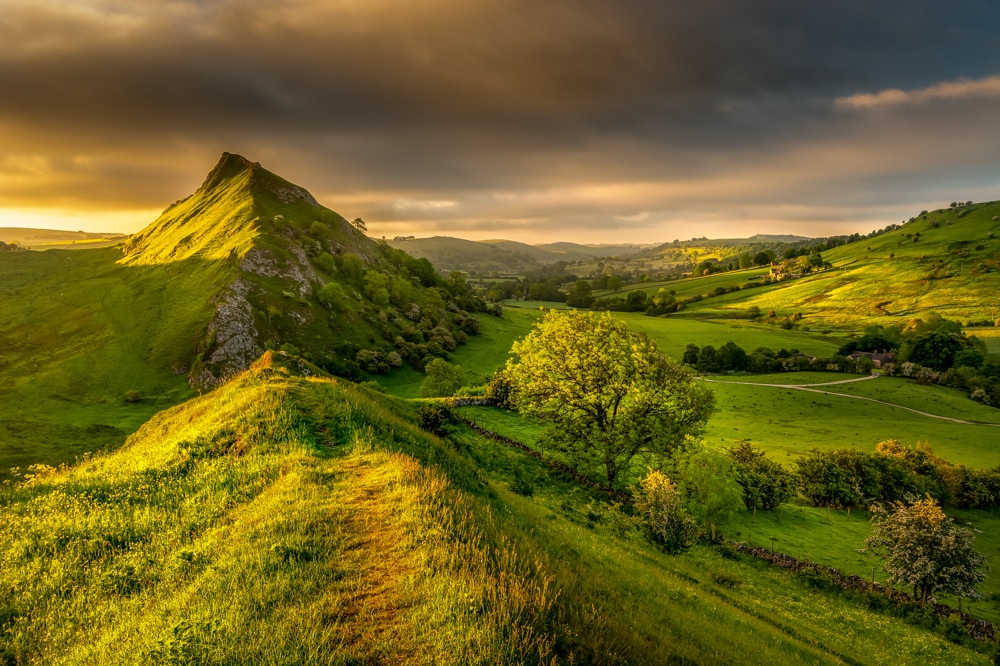
Often referred to as the only true peak in the Peak District, Chrome Hill rarely disappoint hikers. The distinctive line of seven serrated summits is said to resemble the giant ‘plates’ found along the spine of a stegosaurus dinosaur.
10. Stac Pollaidh
Height: 612m (2,008ft)
Location: Scotland
Stac Pollaidh has fascinated geologists for years. Consisting of chocolate-red sandstone, it rests on the Precambrian metamorphic bedrock of Lewisian Gneiss, formed around 1,500 million years ago.
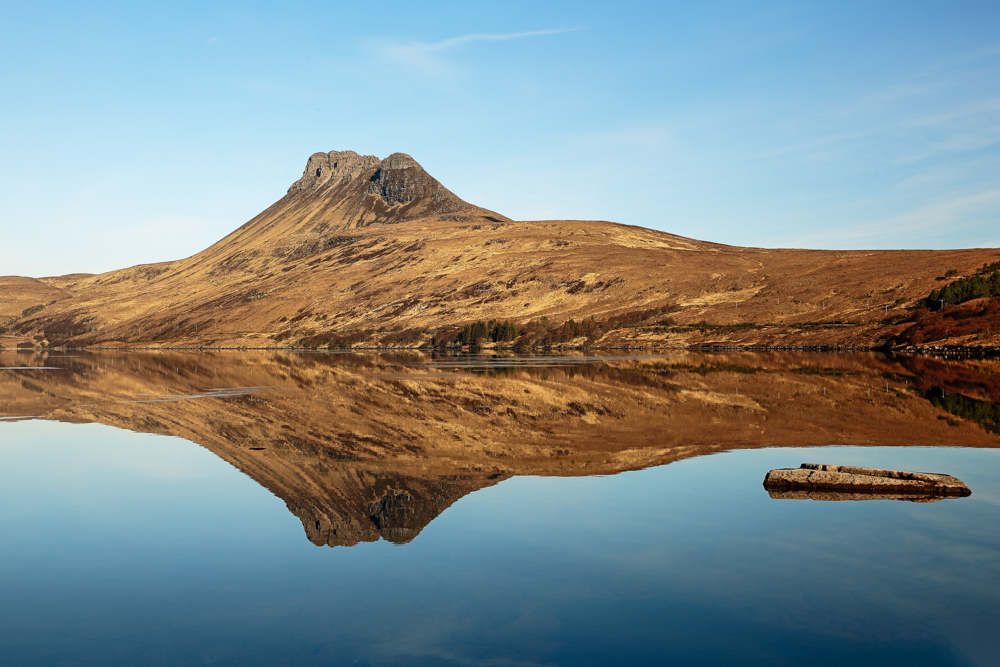
Materialising from a labyrinth of small lochs and rocky outcrops, the colossal ice-smoothed mountain, with its distinctive spiky-topped ridge, creates an unmistakable profile that sets it apart from other mountains in the area. Its sandstone pinnacles boast beguiling names, including The Sphinx, Tam o’ Shanter, Andy Capp and Lobster’s Claw (although this has now partly collapsed and lost some of its height).
11. Schiehallion
Height: 1,083m (3,553ft
Location: Scotland
Nestled in Highland Perthshire, Schiehallion, with its prominent conical shape, towers over the surrounding emerald moors known for their rich botanical life. As such, its Gaelic name – Fairy Hill of the Caledonians – hints at the mountain’s enchanted aura.
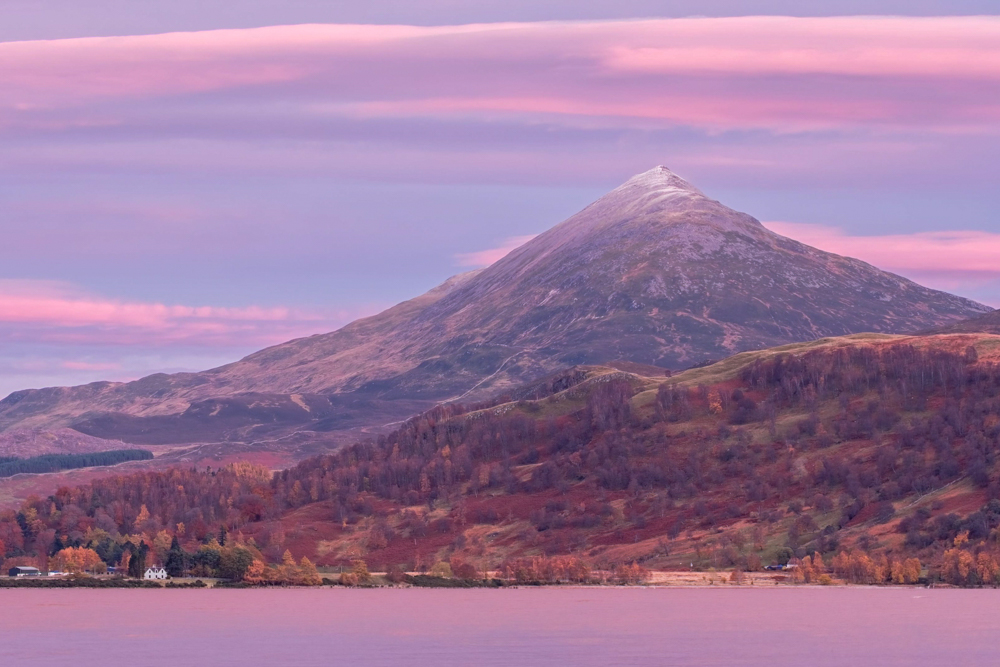
Surrounded by Loch Tay, Loch Rannoch and Loch Tummel, Schiehallion stands gloriously isolated in the landscape, often casting a flawless reflection in the still waters below. In summer, the lower slopes are awash with purple heather that shifts to tawny gold in autumn.
12. Beinn Eighe
Height: 1,010m (3,310ft)
Location: Scotland
Beinn Eighe is a masterclass in geological artwork. Its rugged ridges are carved from ancient Torridonian sandstone and streaked with gleaming white quartzite that catches the light in startling contrast. From its crisscrossing crags to the dramatic peaks of the Ruadh-stac, every angle reveals a new texture. While in winter, its deep snowfields make it feel distinctively Alpine.
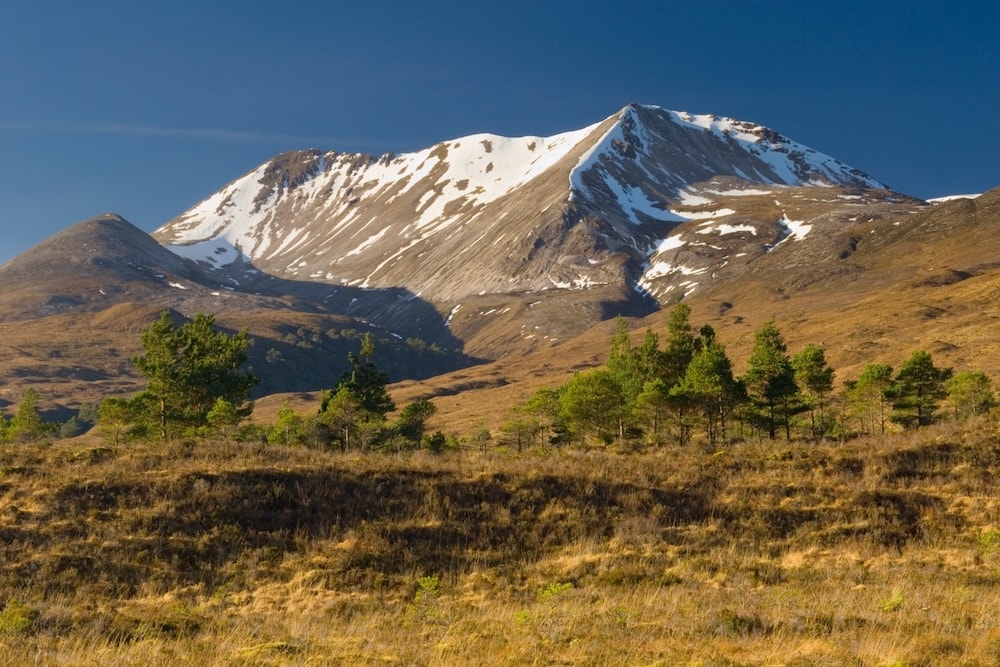
As one of Scotland’s first national nature reserves (founded in 1951), its slopes are draped in wind-battered heather and rare alpine flora. Its lower slopes are home to 350-year-old pine trees and quintessential Scottish wildlife such as crossbills, pine martens, eagles and red deer.
13. Beinn Dearg Mòr
Height: 906m (2,973ft)
Location: Scotland
Tucked away in the rugged wilderness of the Northwest Highlands, Beinn Dearg Mòr commands an awe-inspiring position overlooking the remote waters of Loch na Sealga and the dramatic Fisherfield Forest.
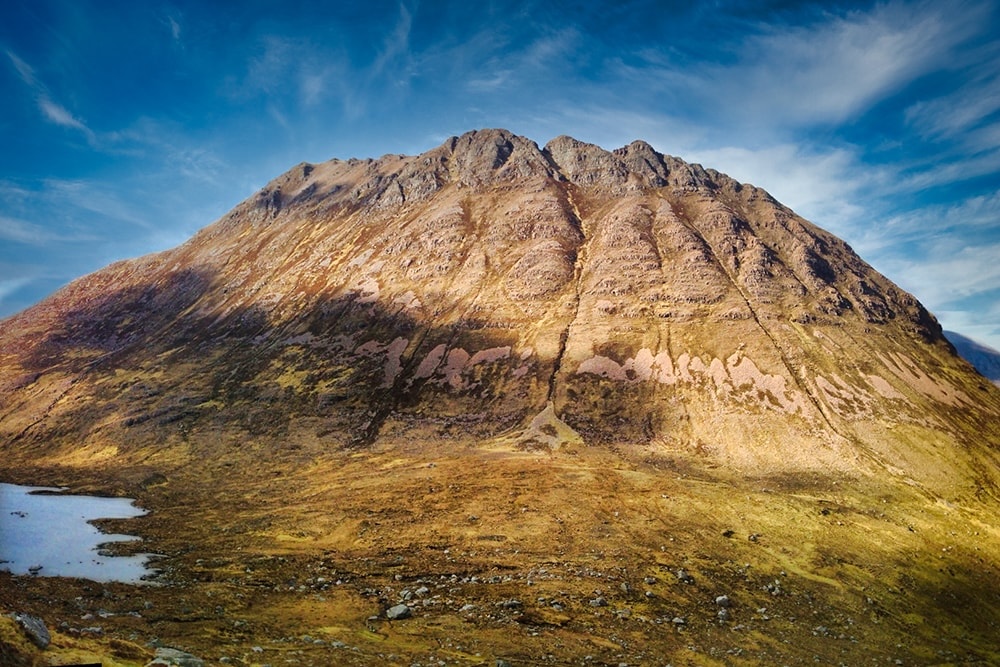
What sets the peak apart is its handsome pyramidal shape, steep flanks and the sense of complete isolation that rewards those who venture into this wild corner of Scotland. The mountain offers a sublime panorama of views stretching to An Teallach, Slioch and the distant Torridon peaks.
14. Canisp
Height: 847m (2,779ft)
Location: Scotland
Rising gracefully above the vast wilderness of Sutherland, Canisp is a quietly majestic mountain. Overshadowed by its iconic neighbour Suilven, Canisp holds its own with a sweeping profile and a sense of solitude that remains rare, even in the remote northwest Highlands.
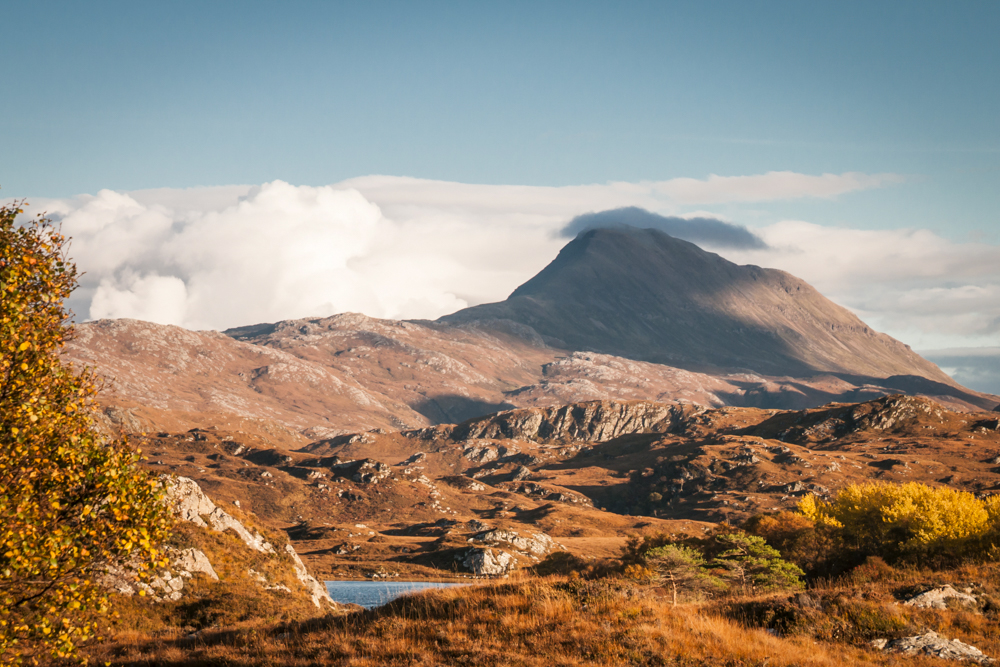
Its quartzite slopes glow in soft light, and the views from its summit are nothing short of breathtaking, stretching across a tapestry of lochs, moorland and sea. It’s a mountain that rewards reflection as much as exertion – perfect for those seeking both a challenge and peace.
15. Black Cuillin
Height: 964m (3,163ft)
Location: Scotland
The Isle of Skye is home to some of the most dramatic and awe-inspiring mountains in the UK. The Cuillin’s jagged ridges, dark gabbro rock and knife-edge summits give it an alpine feel rarely matched anywhere else in Britain.
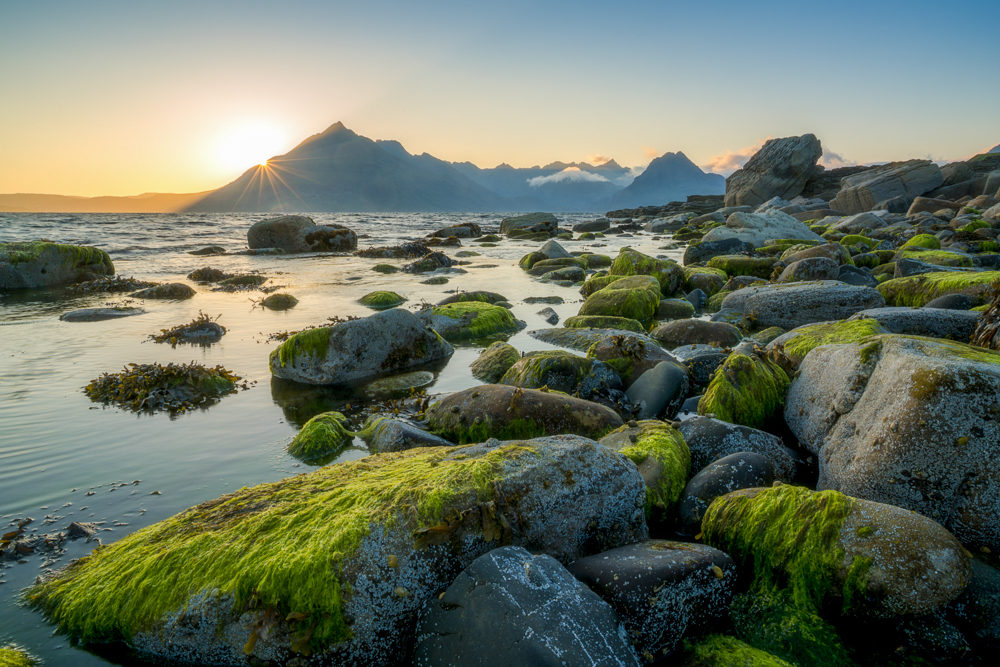
Emerging abruptly from sea to sky, the Black Cuillin offers an arresting silhouette visible for miles, with peaks like Sgùrr Alasdair and Sgùrr nan Gillean providing heart-pounding ascents and unrivalled views across land and sea.
16. Slemish
Height: 437m (1,434ft)
Location: Northern Ireland
Northern Ireland’s answer to Kilimanjaro, Slemish rises steeply from the rolling fields of County Antrim. Its dramatic, isolated shape and volcanic origins give it a powerful presence in the landscape and make it one of Northern Ireland’s most distinctive mountains.
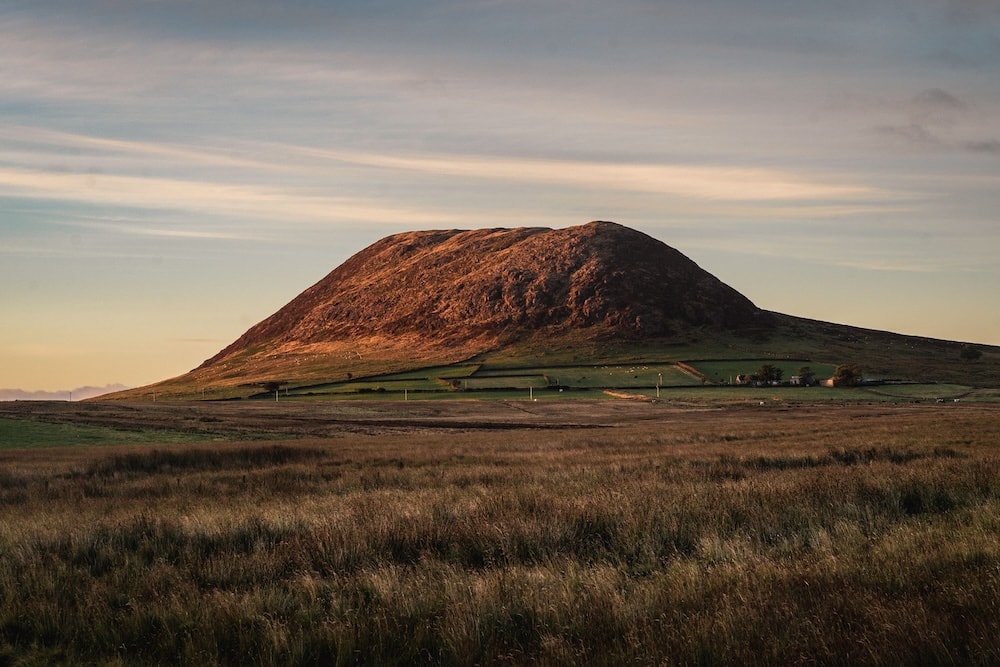
It is also one of the nation’s most storied mountains and is steeped in legend, most famously as the place where Saint Patrick is said to have tended sheep during his enslavement, adding spiritual and historical depth to the peak’s natural beauty.
17. Fleetwith Pike
Height: 648m (2,126ft)
Location: England
Nestled in the heart of the Lake District, Fleetwith Pike holds a special place in the landscape – and in the hearts of many walkers. The impressive peak looms imposingly over Buttermere and the Honister Pass, which lies along the B5289 road connecting Borrowdale and Buttermere.
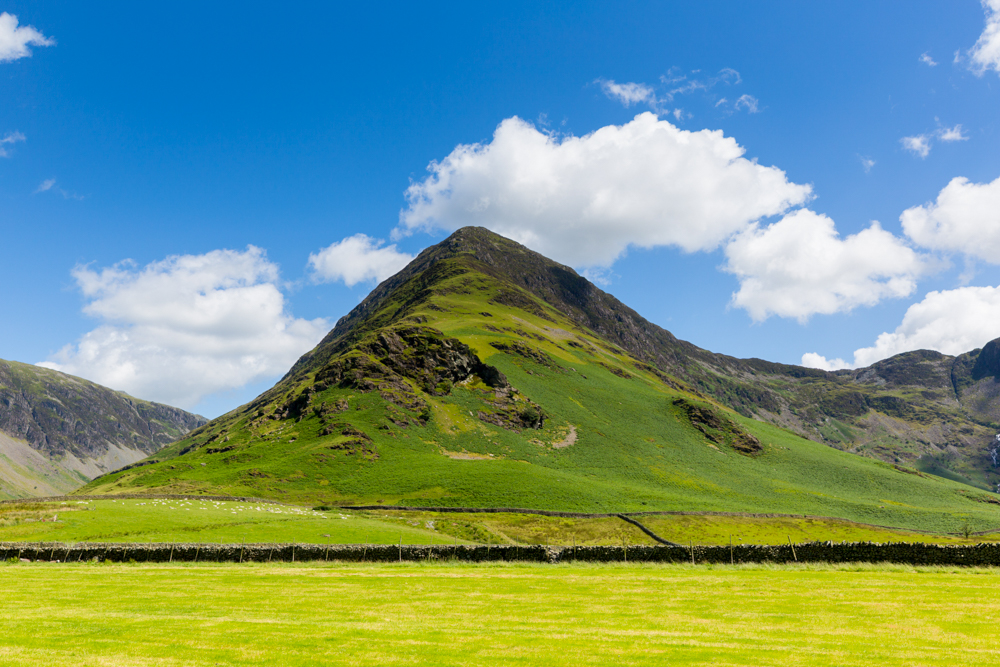
Naturally, the views across Borrowdale, Buttermere and the surrounding fells are nothing short of spectacular, capturing the gentle grandeur that defines the Lakes.
18. Great Gable
Height: 899m (2,949ft)
Location: England
After Scafell Pike, Great Gable was the second mountain I ever climbed in the Lake District and is one of the classic landmarks of England’s largest national park. Its towering, dome-like presence dominates the surrounding fells, offering dramatic views over Wasdale, Borrowdale and the Scafell range.
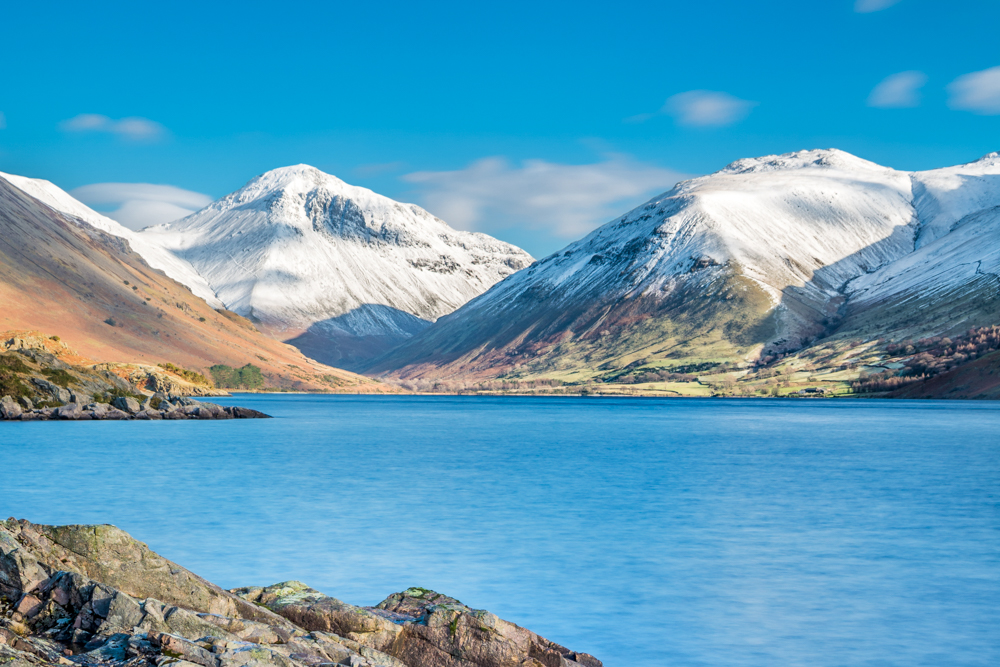
Great Gable also holds a special place in the nation’s heritage. Its summit hosts a memorial to the fallen of the First World War, and each year on Remembrance Sunday, climbers gather to honour their memory.
19. Catbells
Height: 451m (1,480ft)
Location: England
Believed to be a distortion of ‘Cat’s Bield’, meaning ‘refuge of the wildcat’ from a time when wildcats were widespread in Britain, Cat Bells is one of the smallest fells in the Lake District. But despite its modest stature, this ‘mountain in miniature’ is one of the Lakes’ great favourites, as what it lacks in height it makes up for in spectacle.
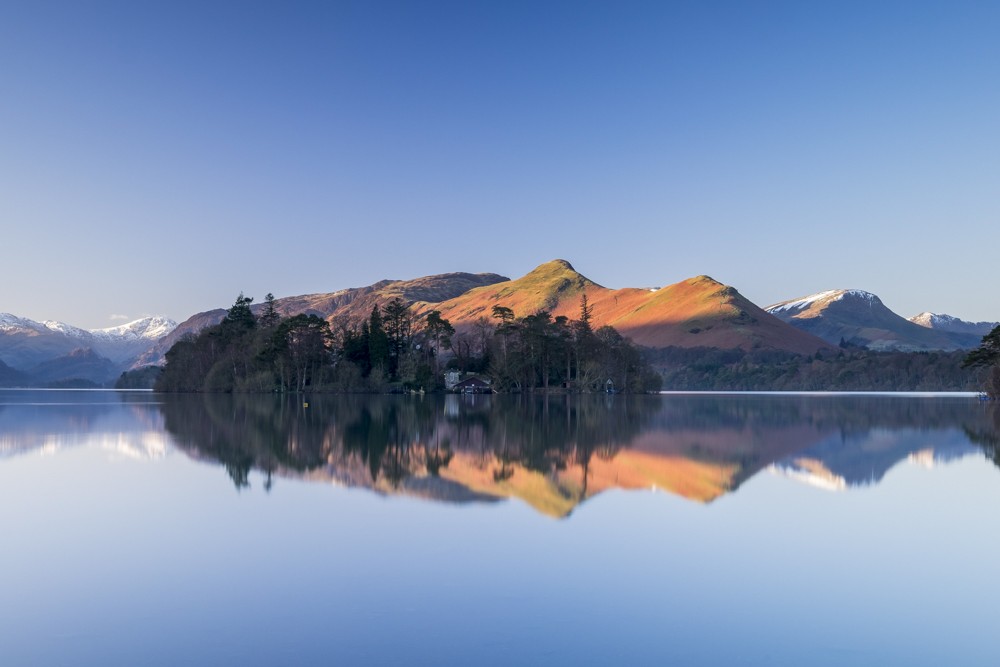
There are several routes up which all track a recently renovated stone path that is straightforward to follow and moderately sloped throughout. Only the final scramble onto the rocky summit plateau could be described as strenuous before the trail tops out at the neat cairn marking its pinnacle.
20. Helm Crag
Height: 405m (1,329ft)
Location: England
Despite its modest height, Helm Crag looms over the village of Grasmere. Its distinctive summit rocks – known as the Lion and the Lamb – make it instantly recognisable and a favourite subject for artists and photographers alike.
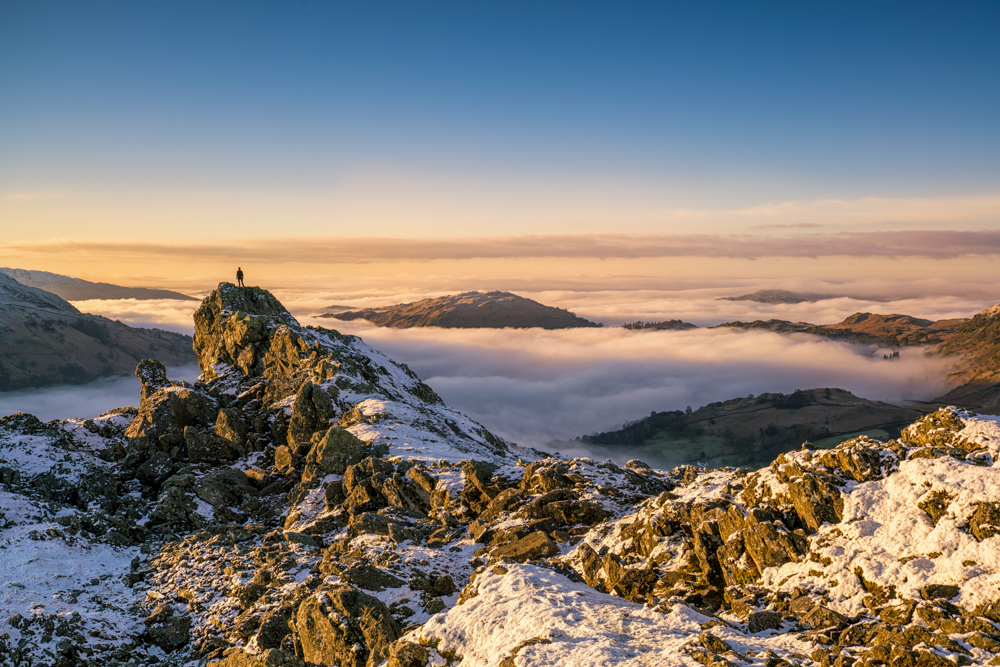
What makes Helm Crag worthy of a spot among the most beautiful mountains in the UK is its perfect blend of charm, character and accessibility. It’s a peak that invites curiosity and storytelling, and its quirky summit features offer a memorable reward for minimal effort. Whether bathed in golden evening light or dusted with winter snow, Helm Crag captures the romantic spirit of the Lake District.
Enjoyed this post? pin it for later…
